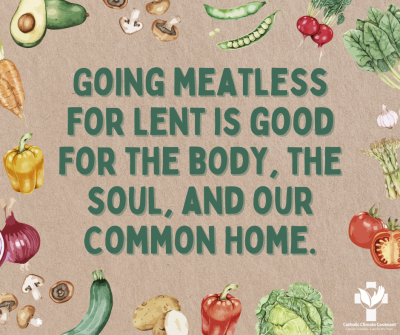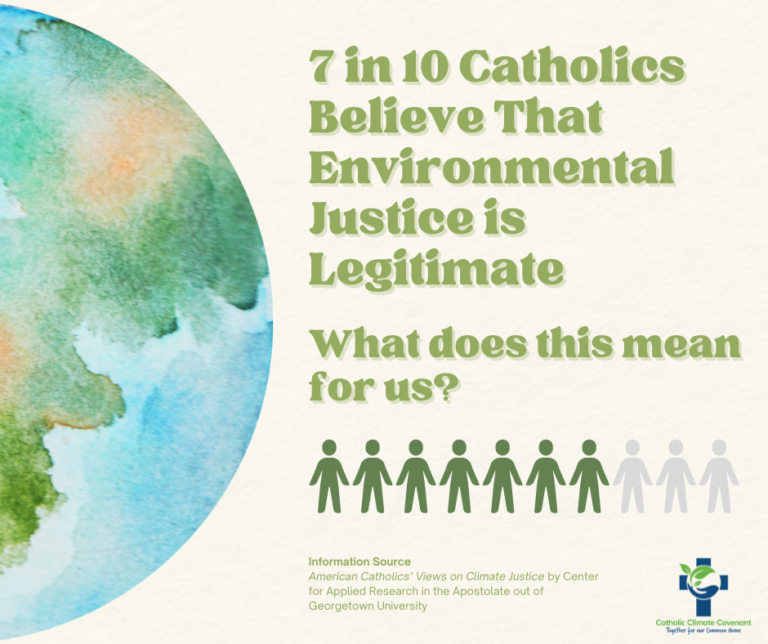For centuries, the Catholic Church has taught that abstaining from meat on Fridays is good for the soul. Later, Catholic leaders praised meatless meals as good for the body as well. Now a growing number of Catholics say there’s yet another reason to cut our consumption of meat: it’s good for our Common Home.
Researchers at England’s University of Cambridge recently released a study that measured the environmental impact of meatless Fridays in the United Kingdom, where bishops revived the practice in 2011. (Catholic bishops in the United States lifted the Friday meat restriction following the Second Vatican Council in 1966, though it remains in place during Lent.)
The Cambridge study found that while just 28% of the United Kingdom’s 4 million Catholics heeded their bishops’ call to refrain from meat on Fridays, it resulted in a reduction of 55,000 tons of carbon annually, the equivalent of 82,000 fewer people flying round-trip from London to New York.
Shaun Larcom, a professor in Cambridge’s Department of Land Economy and lead author of the study, has said that if Catholics in the U.S. adopted year-around meatless Fridays, the reduction in emissions could be as much as 20 times greater.
“The Catholic Church is very well placed to help mitigate climate change, with more than one billion followers around the world,” Larcom said. “Meat agriculture is one of the major drivers of greenhouse gas emissions. If the Pope was to reinstate the obligation for meatless Fridays to all Catholics globally, it could be a major source of low-cost emissions reductions, even if only a minority of Catholics choose to comply.”
In 2022, the Catholic Bishops of England and Wales cited the Cambridge study in a resolution reemphasizing their call for all Catholics to revive the observance of the Friday meat abstinence.
“In abstaining from meat on Fridays, we also act in solidarity with those who face hunger and poverty every day, with the care of creation by recognising the environmental impact of meat production and in memory of the death of Christ, by which our broken relationships with each other and with God’s creation are healed,” the bishops wrote.
While Pope Francis has not indicated that a universal reinstatement of weekly abstinence from meat is on the horizon, he has encouraged Catholics to protect creation by curbing their appetites. “There is an urgent need to reduce the consumption not only of fossil fuels but also of so many superfluous things,” Francis said in a letter to European youth last year. “In certain areas of the world, too, it would be appropriate to consume less meat: this too can help save the environment.”
In addition to carbon emissions, the meat industry uses a massive amount of water and land. A single quarter-pound hamburger patty requires 460 gallons of water — the equivalent of almost 30 showers — to produce. Even small reductions in meat and dairy consumption can make a big difference. If everyone in the U.S. ate no meat or cheese just one day a week, it would have the same environmental impact as taking 7.6 million cars off the road, according to a Stanford University report.
Some Catholics in the U.S. are already doing this on their own. This January, more than thirty parishioners at St. Charles Borromeo Church in Skillman, New Jersey, signed up for a six-week-long Meatless Mondays Challenge organized by the parish’s Care for the Earth Ministry.
“Our hope is that this will be a journey toward discovery,” said the ministry’s Janine Lacava. “I have gotten lots of positive feedback from parishioners who are very excited that we are doing this, not just from the participants but also from parishioners who are already eating a vegetarian or vegan diet because of the impact on the environment. They have stopped me to tell me how happy they are that our parish is trying to address this issue and raise awareness about it.”
View the plan presented to parishioners at St. Charles Borromeo Church last month and you are invited to customize the plan for your parish this Lent, or at any time of the year!



